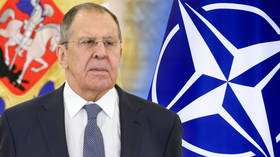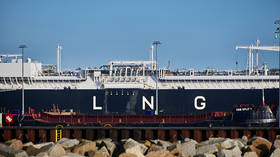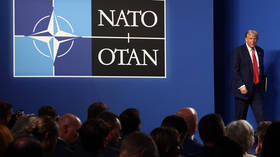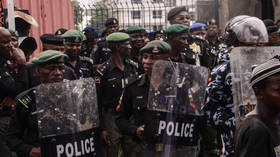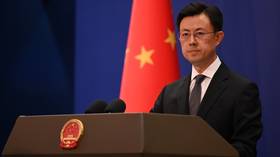‘Like living inside space station’: Julian Assange marks 1,000 days in limbo
It has been exactly 1,000 days since whistleblower Julian Assange was forced to hide out at the Ecuadorian Embassy in London, where outside powers can’t prosecute him. Supporters are holding a vigil for the WikiLeaks founder today.
The forced self-incarceration came in 2010, in the wake of the allegations of sexual assault leveled against him by two Swedish women. The whistleblower has denied the allegations of sexual misconduct and rape.
The ordeal has caused Assange a sizeable amount of both psychological and physical strain. He can’t take one step outside, for fear of being snagged by the British police immediately – which means the sun and fresh air are out of the question. Assange describes this as “living inside a space station.”
Among the few things available to him is sports equipment. He’s run more than 4,000 miles on the treadmill, which is close to the distance between London and Washington DC.
The American capital is what awaits Assange if he is extradited there on charges of whistleblowing.
Although it is difficult to imagine what he may be going through, the WikiLeaks founder has had a long line of celebrity visitors – pop stars, politicians and others. He’s also been keeping busy giving interviews, writing and keeping up an active online presence – even hosting a show on RT, where he spoke to numerous controversial figures, including human rights advocates and others like him who have faced smear campaigns and staunch criticism for their work.
Fans and supporters from across the world have been sending donations, which was a great help. The one positive thing about being cooped up in the embassy is to not have to pay London rent, which soars above almost every other European capital.

The downside to not having his own place means an increased reliance on takeaways – there are no cooking facilities in his quarters.
But Assange is not the only one spending money. The British taxpayer has had to dole out a hefty £10 million, just so an increased police presence could be sustained outside the Ecuadorian Embassy.
The question that remains for some is why the whistleblower chose not to surrender himself to the Swedes; by all accounts, he would have been eligible for parole by now. But his approach has always been not to cave in. Like Edward Snowden’s, Assange’s is a very resilient spirit.
But now he’s been asked to give a DNA sample, while in London, to push the Swedish case further and ascertain his alleged guilt.
While it could be seen as an improvement, a threat still remains. If found guilty, an extradition to Sweden could almost certainly mean extradition to the US, where a death penalty awaits Assange for his work leaking top-secret government documents.
Assange’s Swedish lawyer welcomed the Swedish prosecutors’ request to interview Assange in London, but added that the whole process of questioning could take time. The looming August deadline put pressure on prosecutors, as the statute of limitations was running out.
READ MORE: Swedish prosecutors offer to question Assange in London over rape case
But while Assange’s lawyers call this “a great victory,” his friend and WikiLeaks spokesman, Kristinn Hrafnsson remains outraged by the entire ordeal, which had the victim under immense pressure for 5 years.
“In my mind, the entire saga is a black stain on the human rights record of Sweden,” he said, adding that this was “proof” it was intentionally stalling the process “on false pretenses.”
Hrafnnson likewise believes the US knew this and acted accordingly, taking its time with the investigation.
Gavin Macfayden, director of the Centre for Investigative Journalism, shares the frustration: “This is the longest-serving grand jury in decades… and they haven’t found a single charge, despite a massive, 42-thousand-page FBI investigation.”
While everyone hopes that Assange earns his freedom soon, “it’s a very complicated case,” Macfayden adds.
“If he were extradited for whatever reason” and the guarantees offered by the prosecution are not met, “then the whole thing is a sham.”


